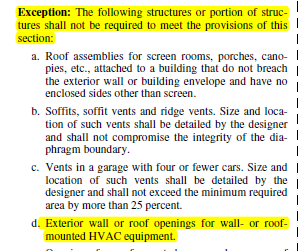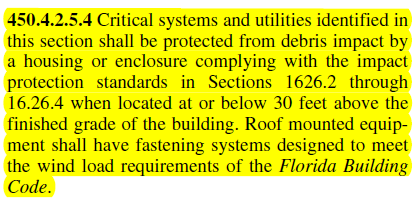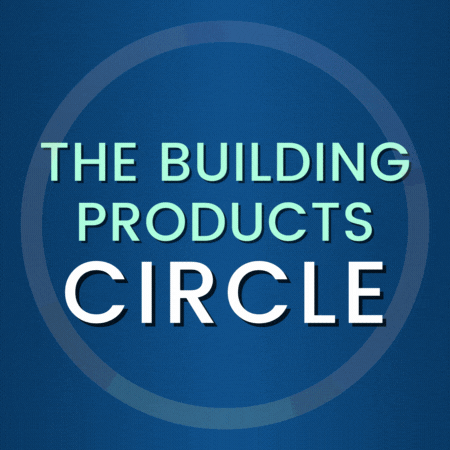Mechanical Equipment – Impact or Not Impact?
Questions frequently arise as to what the rule is in Florida, Miami, and the HVHZ zone (Dade and Broward Counties, FL) under the Florida Building Code (FBC) for impact rating on mechanical equipment. The answer also has similar references in the International Building Code (IBC) for impact areas of the US Coast, and ultimately depends on the type and importance of the structure to which the unit is installed.
Mechanical equipment on a rooftop of a building frequently requires an opening in the building envelope (i.e., the roof) in order to provide airflow to the system. Typically, openings in the building envelope are required to be protected with hurricane impact devices in high wind areas. The question arises then, does the Code also require the mechanical unit to be impact-rated for windborne debris in regions of high wind? The quick answer is – no, unless the structure is a hospital or nursing home (or similar essential facility). Impact resistance is also a function of the vertical slope of the opening. a flat roof is not likely to be subjected to the same missile impact forces as a window or door.
From The Building Code

Reference FBC 2020 section 1626.1.d – there is an exemption that states HVAC equipment does not require impact protection for “standard facilities. It appears that generally speaking, HVAC equipment only requires uniform wind load resistance certification in Miami Dade and Broward Counties, and impact certification is not required in these common structures. However, if the HVAC equipment is installed onto an “Essential Facilities” – the code does require impact protection. Referencing chapter FBC (2020) 449.4.2.5 (hospitals), and similar sections in 450 (nursing homes) – it appears the code does require impact rating for mounting heights of 30 feet or less in these types of structures.

Miami Dade County has been reported as requiring impact for ‘commercial’ but not ‘residential’ buildings which is a loose interpretation of these codes and in our opinion serves more as their guideline rather than a code that is unquestionably enforceable.
Concluding Statements
Our conclusion is that this firm typically advises our clients to seek approval for impact rating only if they will be installing on hospitals and nursing homes (and essential facilities) – and that standard commercial rooftops will not require a large missile impact rating of their mechanical equipment. If a Miami Dade NOA is eventually going to be sought after, testing for impact AND properly notifying Miami Dade of the test are strongly recommended. Conditions may vary for site-specific conditions & we advise you to consult us or discuss the site-specific condition with your design professional or Authority Having Jurisdiction before permitting & construction.
Updated October 2022
Last Update: October 3, 2022
